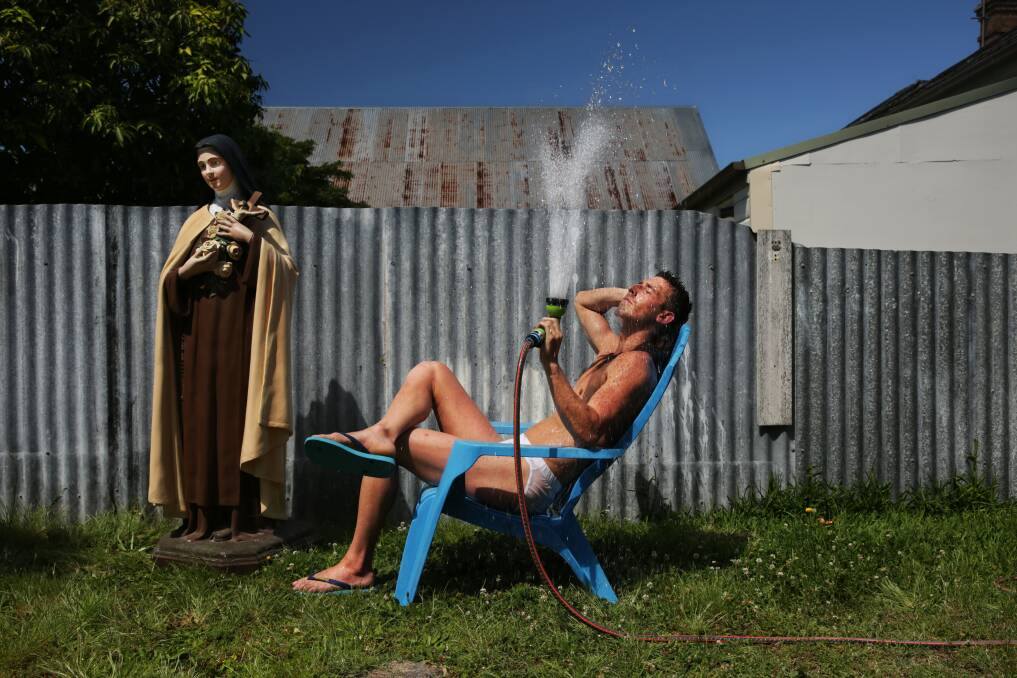
It’s Friday, 1pm sharp, as Dan Brown locks the door from the inside at Lords Coffee & Associates, the slither of a cafe he owns on Beaumont Street, and pulls up a stool.
Subscribe now for unlimited access.
$0/
(min cost $0)
or signup to continue reading
Tanned, lean and muscular from his daily surfs and organic diet, the 29-year-old is in peak form, the whites of his eyes vying for as much attention as his clear baby blues.
It’s almost a year since barista Brown launched the cafe, which has quickly garnered a loyal following in Hamilton, and you could say his reputation is frothing as much as his coffee.
On Instagram he’s known as The Mullet Lord, loud and proud with his signature hair cut, usually enhanced by a thin, handle-bar moustache.
He’s been painted by local artist Dino Consalvo and his cartoon image is plastered across Mullet Boards, his surfboard sponsor, and tattooed on his taut derriere.
He’s a well-known mentor to groms around Newcastle, extolling the benefits of surfing and health over partying, and regularly models for local and Sydney labels.
He recently starred on Channel Nine’s Date Night series, rolling with the reality TV punches with his good-natured and self-deprecating humour.
On that note, he and a mate are setting up a You Tube channel to launch comedy films in which they act and direct – a move that won’t surprise Brown’s earliest Instagram fans.
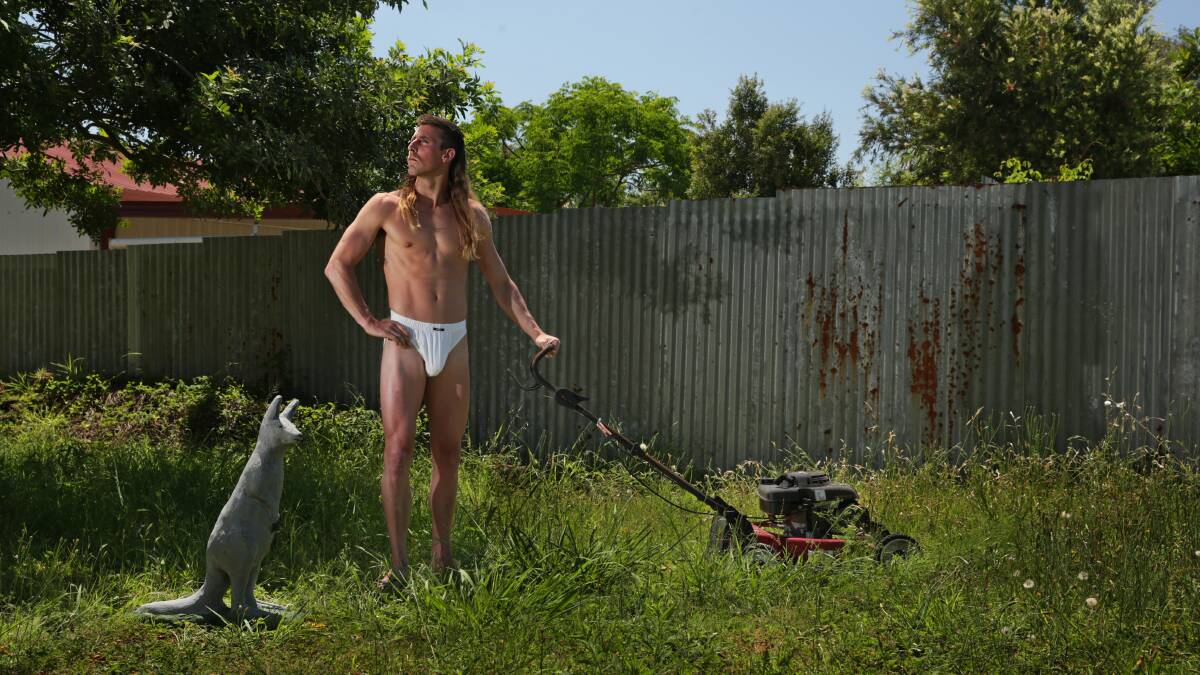
He was a guest judge at this year’s inaugural Mulletfest in Kurri Kurri, an event that attracted global media coverage.
So, is he ready for fame?
“My ego says yes, but I don’t know how good it would be for me,” he says carefully, sipping a sparkling water as the cafe equipment hums softly behind him.
Could Brown, one part extrovert, the other an introvert and self-described “old soul” who is often asleep by 8pm, handle the spotlight?
“Probably a year ago I wouldn’t have,” he says after some thought, “but where I am these days, in my own self, yeah.”
Raised in Copacabana on the Central Coast, Brown was born with a “spiritual maladjustment to life”, with overwhelming feelings of being an outcast exacerbated by an “unstable” family home where domestic abuse also dwelled.
Brown says he was 11 when his father walked out, returning periodically.
I took on the role of the man of the house at a gut level and put a lot of pressure on myself to get rich because we never had any money and mum was stressed out due to finance.
“I took on the role of the man of the house at a gut level and put a lot of pressure on myself to get rich because we never had any money and mum was stressed out due to finance,” he says.
The only place Brown felt in peace was in the surf, where he would gravitate before and after school to escape his ingrained sentiment of being an outcast.
Ethan Ortlipp, owner of Newcastle businesses including popular bar Coal & Cedar, was surfing the same waters and remembers Brown shining at the Avoca Boardrider’s Club, being regularly picked for world tours.
“He seemed to surf for the entertainment of others most of the time, trying to make everyone laugh, which I think also may have contributed to him becoming quite a formidable and fearless big wave surfer,” Ortlipp says.
Brown recalls he was the “golden child” until he was 16, when he tried alcohol for the first time.
“I felt this ease and comfort, a warmth inside. I felt peace with the world and the people on it. I was even funnier, the music sounded better. Better still, the pressure that I put on myself, and all the responsibilities I had laid upon myself were washed away.”
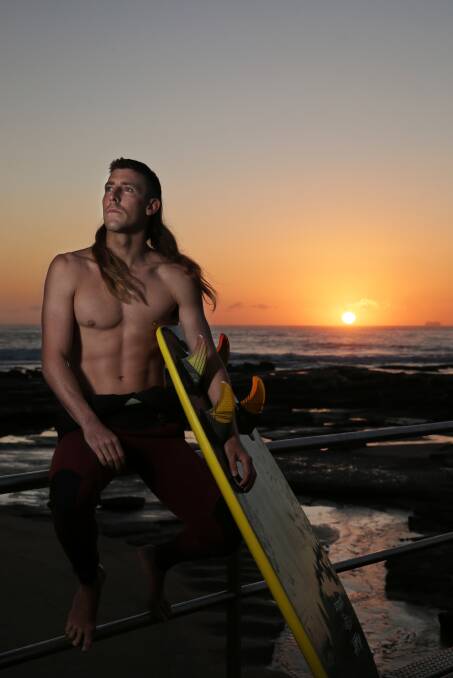
At first a weekend binger, Brown’s predilection for booze was curbed only when he was trying to stay in form as he competed around Australia on the pro junior series.
By 18, his alcoholism was beginning to take a grip.
Quitting competitive surfing he headed to Sydney and worked at a luxury hotel, earning $1000 a week over four days and partying for three.
“I found ecstasy, weed, cocaine, mushrooms, speed and I started smoking. I always told my friends I was going to quit and have fitness stints but I’d always rationalise that I deserved a drink or smoke because I was going so well,” he says.
At 22, he gave in to a daily drink. Living in Randwick because he’d been black-listed for rentals on the Central Coast due to his party habits, he was also getting into scraps.
I stabbed myself in the arm and sewed it up myself, I was purposely overdosing on drugs, putting cigarettes out on myself. I front-flipped on glass and gashed my back and almost bled out. I got some time off work and drank harder.
“That is how Dad solved any conflict, and I was banned from every single nightclub on the Central Coast and a few in Kings Cross,” he says.
He had a girlfriend who was recovering from an ice addition and when they began drinking together it started a “huge compulsion”. He was soon selling pills and his alcoholism worsened. He maxed out credit cards, sold his car for a fraction of its value, and faced court for drug possession.
He arranged to go to rehab but, feeling better before his departure, spent his tax return on a trip to Bali, where he drank so much his feet began to swell.
“When I came back I was on another level, I was losing my mind and my alcohol and drug tolerance felt so high . . . I was reckless,” he says.
“I stabbed myself in the arm and sewed it up myself, I was purposely overdosing on drugs, putting cigarettes out on myself. I front-flipped on glass and gashed my back and almost bled out. I got some time off work and drank harder.”
Brown was 23 when he and some mates were given some pills at a Bondi pub.
“I had had half a carton of rum, or 12 cans, and a gram of coke, and I only got one [pill] and the guy said ‘You don’t need anymore’,” he recalls.
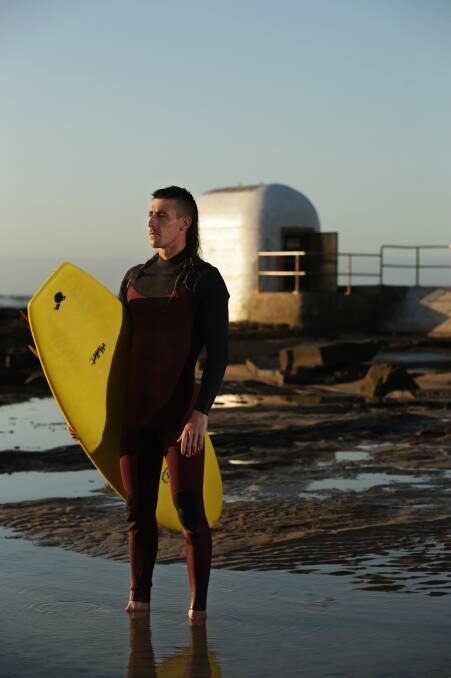
Back at his home, he cut the pill in three and snorted his share.
“It hit me straight away, it was like bath salts, a synthetic drug that is way stronger than your normal MDMA or acid,” he says.
Brown was sick before he leapt onto the roof of his car and all but caved it in, prompting four police officers to tackle him.
Lying on his stomach, thrashing against the gravel, he tore skin off his face and his friends recall his eyes rolling back and him frothing at the mouth.
Sedated by ambulance officers, he woke in hospital 15 hours later.
But not before a near-death experience caused his soul to “travel to a new dimension”.
I got to a point where these people on the other dimension got in touch with the inner strength I have.
“Some people call it heaven, I experienced connections with other souls up there,” Brown says.
In response to any sceptics, Brown points to American neurologist Eben Alexander, who suffered a near-death experience when he had a brain aneurism, and has written extensively on his belief of the afterlife and the ability of consciousness to survive death.
“A lot of people have had near-death experiences like mine,” he says. “I got to a point where these people on the other dimension got in touch with the inner strength I have, and I really got in touch with that there.”
His “fight for life” was also the start of his recovery.
Leaving hospital without telling doctors of his history of self-medication, Brown returned to his old drinking ways to cope.
Within a week, he got on a train to Newcastle and was inevitably kicked out of Coal & Cedar run by his old friend Ortlipp.
“He was clearly not the person I knew,” recalls Ortlipp of the incident.
“You could see it physically and emotionally in him. My friend and business partner Ryan Hawthorne had grown up with him … and I remember discussing Daniel after that incident, which had evolved into bigger ones elsewhere over the next few days for Daniel. The questions was 'do we?' and, if so 'how do we?', intervene.”
Abstaining from alcohol on the train back to Sydney, Brown says he had “like a seizure” because of how reliant he had become on alcohol.
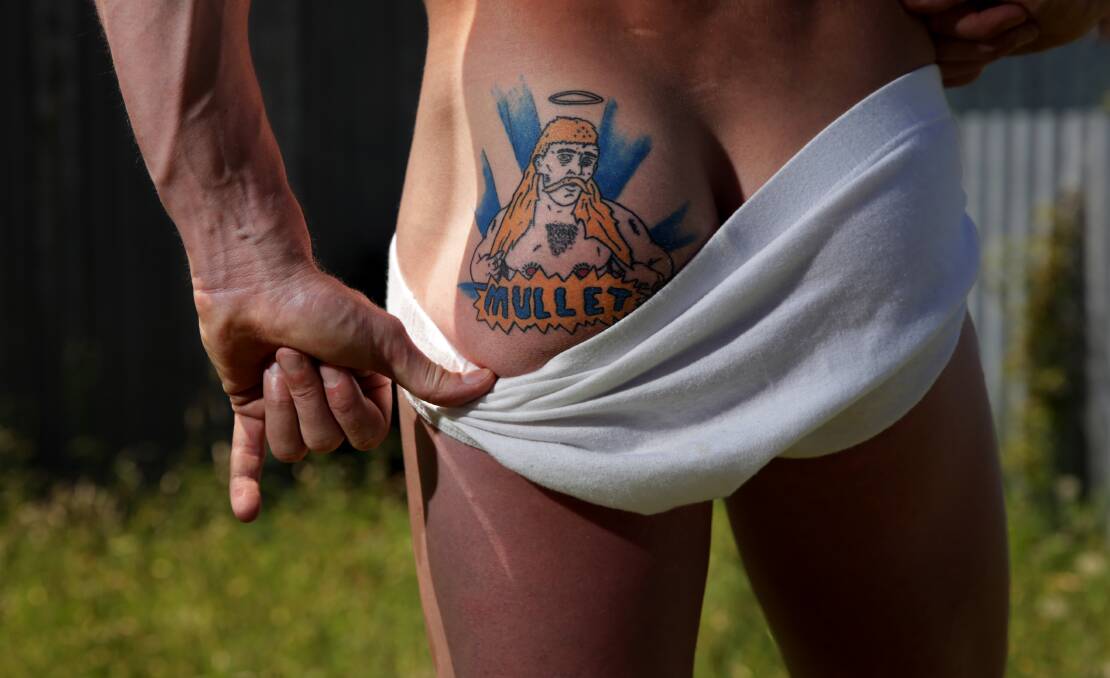
“I had the deep DTs [delirium tremens, or a rapid onset of confusion typically caused by alcohol withdrawal] and hallucinations. It feels like bugs are crawling under your skin, there are voices in your head, people tapping you but no-one is there. Your whole nervous system plays up on you,” he says.
“I thought it was like a psychosis. I called a friend and got picked up and left all my stuff on the train because I just had to get out of there, I was freaking out. No one else knew the severity of what was going on, it was all happening inside my own head.”
Amid all the blur, Brown felt the calling of the ocean.
“It was like just get me down to the beach. It was like mind over matter. I had told myself previously that I would be OK once I got into the water,” he says of his decision to head directly to Bondi beach.
“I just stripped off and dove into the ocean and as I was laying there I felt my brain chemicals settle.”
When a mate bought him three long necks of beer within hours, Brown refused.
His mother took him to a rehabilitation centre and he was soon on anti-psychotic medication and valium as he withdrew from alcohol.
“This is how cunning alcoholism is, it became all about me, I was self-centred, and when I got sober it helped me project my thoughts outwards rather than inwards. I got to see the harm I did, which was exactly like Dad.”
Two years into sobriety, Brown hit an emotional bottom, describing himself as suicidal. Seeking professional help, he was diagnosed with PTSD, anxiety and depression for which he took medication.
By the time he decided to call Newcastle home in early 2016, he was three years’ sober.
I got stripped back to my body, that’s all I had.
He began working as a barista and a gardener about the city, living on little, before running a pop-up cafe in a vintage clothing shop in Newcastle West.
“Life was actually hard in that year, because nothing went my way. I got stripped back to nothing again,” he recalls.
“I was saving [to set up Lords Coffee & Associates] and my car got repossessed because I had a loan. I went vegan because I couldn’t afford meat. I got stripped back to my body, that’s all I had.”
His “surrender” to his own, personal Jesus and a program of helping others grounded him.
While not religious per se, he describes himself as spiritual.
“I look back at everything that has occurred… to how I haven’t died, and it’s been so divine the way I have been moved around to get to the point that I have been to,” he says.
“That’s my God. The spirit of the universe, the flow you get into when you are spreading love and giving.”
Today Brown has a humble acceptance of who he is and what he has to do to stay well: help others, love unconditionally and surf.
Daily meditation and a healthy diet help, so too the support of his close-knit family – his mum and siblings Josh and Sophie, both of whom have worked in the Hamilton cafe.
Brown is big on keeping things real – being honest about his past struggles as he happily plans his future.
“People always show the great things, but life …. to be honest it’s been 80 per cent of a trudge and 20 per cent joy or happiness,” he says.
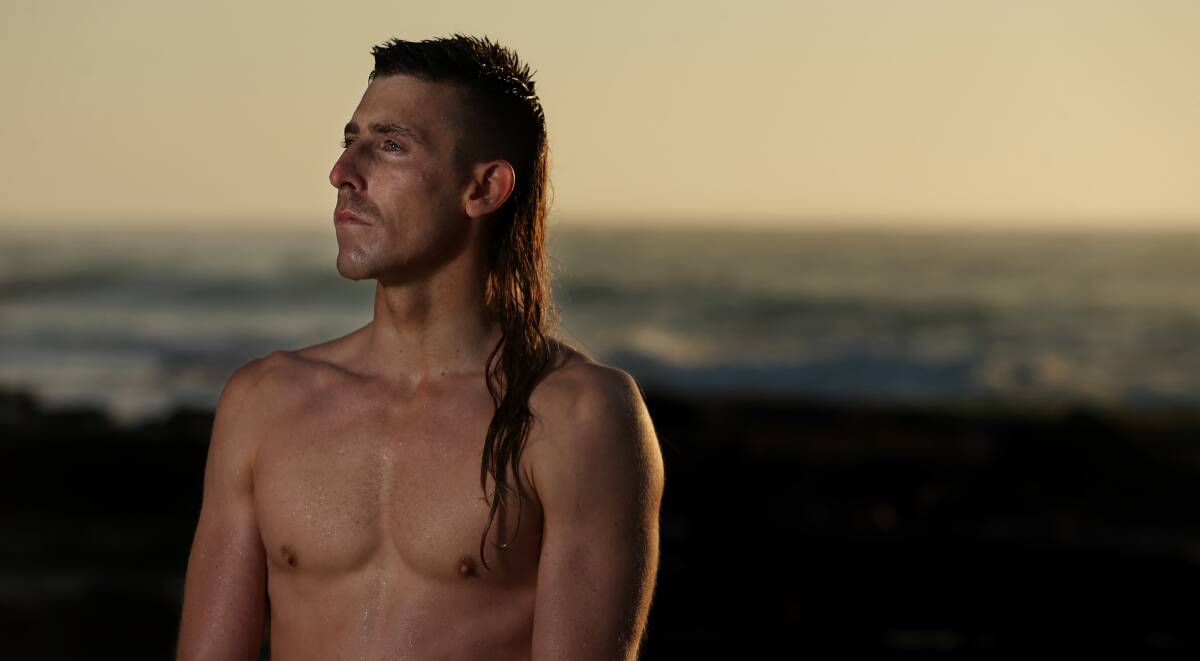
Everyone, continues Brown, has their issues, but there’s not enough conversation about them.
“A lot of people are struggling. I have a lot of fears that crop up but [I think] you’ve always been ok, you will be alright,” he says.
“I see what happened before as a blessing in disguise, like a gift wrapped in shit. The reality of addiction is either people go insane or they die and then the lucky few survive and get sober.”
Ortlipp views Brown’s recovery as an amazing journey of success.
“There was doubt he could do it, including from myself, but now I am humbled by not only the resurgence of his health but what he has done for others dealing with similar issues,” he says.
“We could all take a leaf out of Browny’s book for time spent in the water, working and eating well.
“Dan isn’t a just a role model for surfers. He is a role model for recovery itself. Strong of mind, strong of body and strong of mullet.”
Brown has aspirations to revive his professional surfing, is training in free diving and is in his element at his Hamilton cafe.
“Hospitality for me has come naturally, it’s just a comfortable place for people to come and have coffee and it’s authentic,” he says of the cosy space he has created.
“In Sydney I missed that – people came in and just got their coffee. Here, I enjoy the relationship with everyone. Their coffee is personalised and when they come in we talk about what they are doing, I help them, they help me, it’s beautiful.
I love making people laugh. That is why I do it. I sometimes feel myself taking life too seriously and I never want to.
“There’s a lot of love here, people want to be a part of it.”
He’s excited about his You Tube channel, his sense of humour fed by “a whirlwind of confusion and popping out the other end”.
“I love making people laugh. That is why I do it. I sometimes feel myself taking life too seriously and I never want to,” he says.
“I’ll have my haircut and look at myself in the mirror and have a good laugh. Life is meant to be enjoyed.”
Happiness is, he says, “being free from myself and being able to live in the moment and enjoy each moment as it comes.”
Brown says he’ll never drink again, but knows the better his life gets, the bigger the temptation and the bigger the effort to keep it at bay.
“So I just have to delve harder into helping others,” he says.
Brown stands up and stretches before heading out onto Beaumont street with purpose.
He’s off to pick up a cheap car he’s bought for the 15-year-old youth he is close to fostering.
“If it wasn’t for mum being so solid, we would have been up for adoption,” he explains of his motivation.
“Now that I am ok, there are a lot of kids out there who aren’t, and I am now in a position financially where I am ok,” he says with a hint of pride.
“So that is pretty exciting. My whole life will change.”

